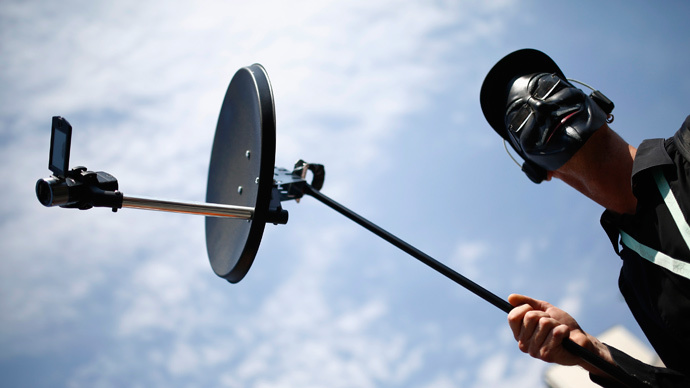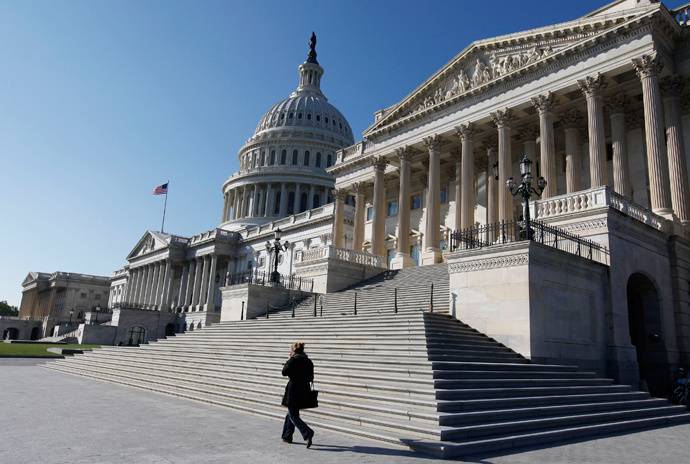‘Freedom Act will make no difference’ to NSA surveillance

The only practical effect of the US Freedom Act will be that now the NSA has to file a request to the court to get data from the telephone companies, but the same volume of NSA spying will remain, says Ted Rall, a political cartoonist and author.
The US Senate has passed the so-called US Freedom Act, the first surveillance reform in a decade in America. It comes just over a day after the infamous Patriot Act that provided legal grounds for the National Security Agency's snooping expired.
RT:The Freedom Act has been passed, is it a step in the right direction? There have been claims by some US lawmakers that it does not go far enough, what's your take?
READ MORE: Senate passes USA Freedom Act, limiting NSA surveillance powers
Ted Rall: It’s a symbolic step in the right direction, but it is not meaningful in a practical sense at all. The vast majority of NSA programs were not even under discussion in the debate over the Freedom Act. There are programs, like MYSTIC, that actually record and store the voice recording of your phone calls for at least five years. There is another program called GUMFISH, in which the NSA can turn on people’s laptop and other computer cameras and spy on them. There are even reports that they take photographs of people having sex and store them and pass them around as Edward Snowden told us. Those programs continue unaffected, and even when it comes down to the telephone metadata program, which is the only thing that the Freedom Act affects it’s really just symbolic. What’s happening is that the data is going to stay with the phone companies instead of going to the NSA servers. But the NSA will be able to get it just as easily as before, and the reason that is, is that the NSA will be able to ask the FISA Court for approval.
Some Americans may recall that the FISA Court, the Foreign Intelligence Surveillance Court, is not a real court. It’s a rubber stamp body that never hears from privacy advocates or from any lawyers who represent the people who the NSA wants to spy upon. It’s only the government that gets to have their say and historically the FISA court always approves every single request to spy on people. In 2012, for example, they asked for 1,856 warrants and they received 1,856 warrants. In 2011, they asked for 1,674 warrants and the FISA courts said “Yes” to all 1,674 warrants. And it’s like that year after year.

The only practical effect of the Freedom Act will be that now the NSA has to file an extra form, a request to the FISA court, which will inevitably say “Yes” and then they have to get the data from the telephone companies. But it’s not going to make any difference in terms of being spied upon. The same amount of NSA spying against the American people will continues as before.
RT:The Freedom Act says that the NSA will need a warrant for getting private data from telecom companies. Do you think that will be an easy task?
TR: Yes, I think it’s very easy for the Senate and the House, both Democrats and Republicans, to get behind this because it effectively doesn’t do anything other than symbolically pretend to rein in the NSA. But the practical effects are zero. Let’s not forget, what really should have happened here is that the NSA should have been shut down after it was discovered that they were violating their fundamental charter which makes it illegal for them to spy on Americans at all. And instead, they are doing mass intentional surveillance of the American people in every aspect imaginable, in many things, in many ways that no one could have imagined. The NSA if they were corporation would have been shut down and its top officials should be arrested and imprisoned. Instead what we are getting is this window dressing.
READ MORE: Obama signs NSA reform bill, but agency still can collect data via phone companies
RT:The bill is said to limit the NSA's powers, but can it be a real bulwark against the agency's appetite for personal data?
TR: I would like to think that this is the first step “down the road” toward enhanced protection of privacy, but history teaches us a different lesson. As the progressive politician Robert M. La Follette said over a hundred years ago: With legislation, the appetite for change tends to be diminished with small reforms. So it’s better to hold out for something truly good, otherwise people tend to think that the problem is solved. The American people are busy, they are working long hours and multiple jobs and they are not following the news in as much detail as perhaps RT viewers are and as much as I have to for work. So most people will look at the headlines and will say the “US Freedom Act passes, NSA reined in” and they’ll think that that’s what happened, they won’t take any deeper and they’ll think that the problem of NSA surveillance against the American people has been resolved when in fact that’s not even slightly true. I’m afraid that people will move on to the next issue and stop thinking that their privacy is at risk from the NSA. Although that’s not the case.
The statements, views and opinions expressed in this column are solely those of the author and do not necessarily represent those of RT.
The statements, views and opinions expressed in this column are solely those of the author and do not necessarily represent those of RT.












